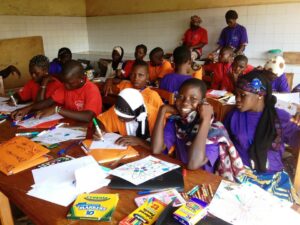International Day of the Girl Child 2019 Theme: GirlForce: Unscripted and unstoppable
By Helen John, Gender, Social Inclusion, and Community Engagement Advisor, Bauchi-Nigeria
“You were meant to be a queen
Even though you are hidden behind the curtain,
your majesty, the world awaits your ascension
oh do not fear, grab your rod, your symbol of authority with a smile and rule
Because you are unscripted, unstoppable!”
- Okwy Obu is a writer

Girls enjoy camp activities. Photo Credit: Kelly Dale who resides in Enugu, Nigeria
For many young and adolescent girls around the world, childhood is a time of oppression and abuse instead of education and play. Especially in developing countries. In Nigeria, 44% of girls are married before their 18th birthday and 18% are married before the age of 15 (UNICEF State of the World’s Children, 2017).
Further, a girl child faces unique challenges that limit her otherwise expansive potential. In many countries, culture and harmful traditional practices deny girls and women the right to attend school and be educated, make decisions freely, own land, inherit property, and get into gainful employment.
Our world seems to limit girls at every turn. All over the world, but especially in developing countries, girls are also exposed to gender-based violence. In Nigeria for instance, the abduction of 276 Chibok girls in 2014 was just one instance of a disturbing tactic used by Boko Haram – child marriage as a weapon of war.
By empowering girls, we give them the key to economic growth, political stability and social transformation. This is because girls, who will a few years down the road become women, know what is good for their families. Also, increasing girls’ enrollment, promoting meaningful employability skills and empowering girls to develop essential life skills such as self-confidence, assertiveness, and the ability to participate effectively in society are essential ingredients in her journey to maximizing her potentials.
If a generation of girls in the developing world could focus their energy on learning the social and technical skills to pursue lucrative careers, finding innovative ways to support themselves and their societies, and making decisions about their own lives and bodies, their entire communities would benefit from their potential.
As we focus on an empowered girl by 2030, girl child empowerment and gender equality will become a mirage if the progressive forces don’t rise up to arrest the challenges that can mar the development of the girl child and deny her, as well as the nation, of benefiting from her active participation in the development of their communities, regions, and country.
Therefore, government at all levels, local council leaders, clan leaders and families should find means of doing away with disempowering social-cultural beliefs, such as that the woman’s place is in the kitchen; women are not supposed to say anything during social gatherings; and certain jobs are not meant for women. Additionally, all stakeholders need to work hand-in-hand to get rid of structural barriers in the economic, social, and political spheres that reinforce inequality among girls and women. This is because these obstacles are the major causes of violence against girls and women and hinder sustainable development.
In my view, the most veritable tool that will make the girl child “unscripted and unstoppable” is to provide quality and relevant education. Education is the gateway to preventing gender inequality because it positions her to make informed decision about her health, delay marriage, acquire skills to fit into social, economic, and political life.
It’s time to stop restraining girls and start supporting them. Let’s save the girl child. Her challenges are our challenges; her success is a plus for national development!
The USAID Integrated Health Program (IHP), led by Palladium, currently provides technical assistance to three States in Nigeria – Kebbi, Bauchi, and Sokoto – to strengthen health systems and improve access to and quality of RMNCH+NM and primary health care services. Expert gender integration and social inclusion partner, WI-HER, LLC, leads efforts that promote equitable services that reach the most marginalized populations while working to advance IHP goals and objectives.